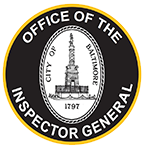

Any employee who suspects that personnel action was taken against them for making a covered disclosure may file a Whistleblower Complaint with the Office of the Inspector General.
Complete the Whistleblower Complaint Form as a PDF here.
Download, complete, and return the Whistleblower Complaint Form to the Office of the Inspector General by email to oig@baltimorecity.gov or by mail to:
The City of Baltimore (“City”) is committed to developing a work culture and environment that supports transparency and accountability regarding City resources. The public interest is served when employees report fraud, gross misuse or waste of public resources, violations of law, and substantial and specific threats to public health, safety, or security, without fear of actual or threatened retaliation or reprisal.
An essential resource is the protection of employees who make covered disclosures (i.e., “whistleblowers”).
A covered disclosure is a disclosure made to either your supervisor, your chain of command, the Office of Inspector General, or a Human Resource officer that you reasonably believe is evidence of:
Unless a disclosure is specifically prohibited by law, a supervisor may not take a retaliatory personnel action against any employee for making a covered disclosure.
A personnel action means an act or omission by a supervisor that has a significant adverse impact on an employee, including dismissal, demotion, suspension, punitive transfer or assignment, disciplinary action, negative performance evaluation, failure to appoint, failure to promote, failure to transfer, or failure to assign.
Nothing in this policy prohibits a supervisor from taking a personnel action against an employee if the supervisor would have taken such action regardless of the covered disclosure.
For a complainant to be a whistleblower, there must be a covered disclosure and a prohibited personnel action.
The Baltimore City Code prohibits retaliatory personnel actions against City employees who make a covered disclosure. See City Code, Art. 1, Section 8-3.
"Employee" means an employee of a City agency, whether employed full-time, part-time, seasonal, contractual or otherwise, including any member of a City board or commission, regardless of whether the member is compensated.
Personel matters or grievances and policy disagreements do not qualify as "covered disclosures" protected by Subtitle 8 of the City Code ("Whistleblower Rights and Responsibilities.")
If your covered disclosure involves you asserting your rights to be free from discrimination under the protected categories of the Equal Employment Opportunity Commission (EEOC) (race, color, religion, sex (including pregnancy and related conditions, gender identity, and sexual orientation), national origin, age (40 or older), disability or genetic information), you must file any retaliation claims with the EEOC.
A complaint must be filed with the Office of the Inspector General or your Human Resources officer. To file a complaint with the Office of the Inspector General, please download, complete, and return the Whistleblower Complaint Form to oig@baltimorecity.gov or 100 N. Holliday Street, Room 635, Baltimore, MD 21202.
The Baltimore City Code prohibits retaliatory personnel actions against whistleblowers for making a covered disclosure. See City Code, Art. 1, Section 8-3.